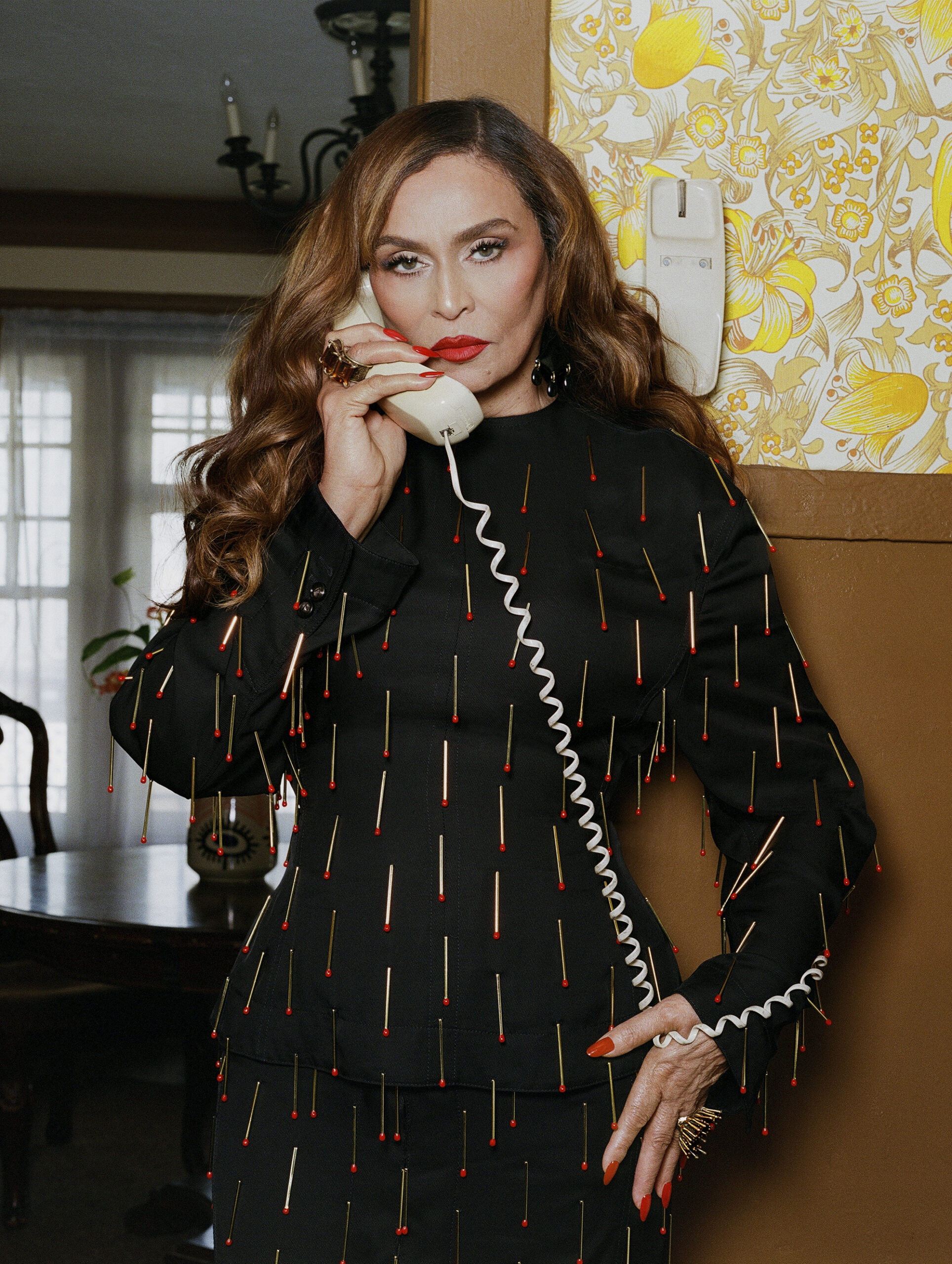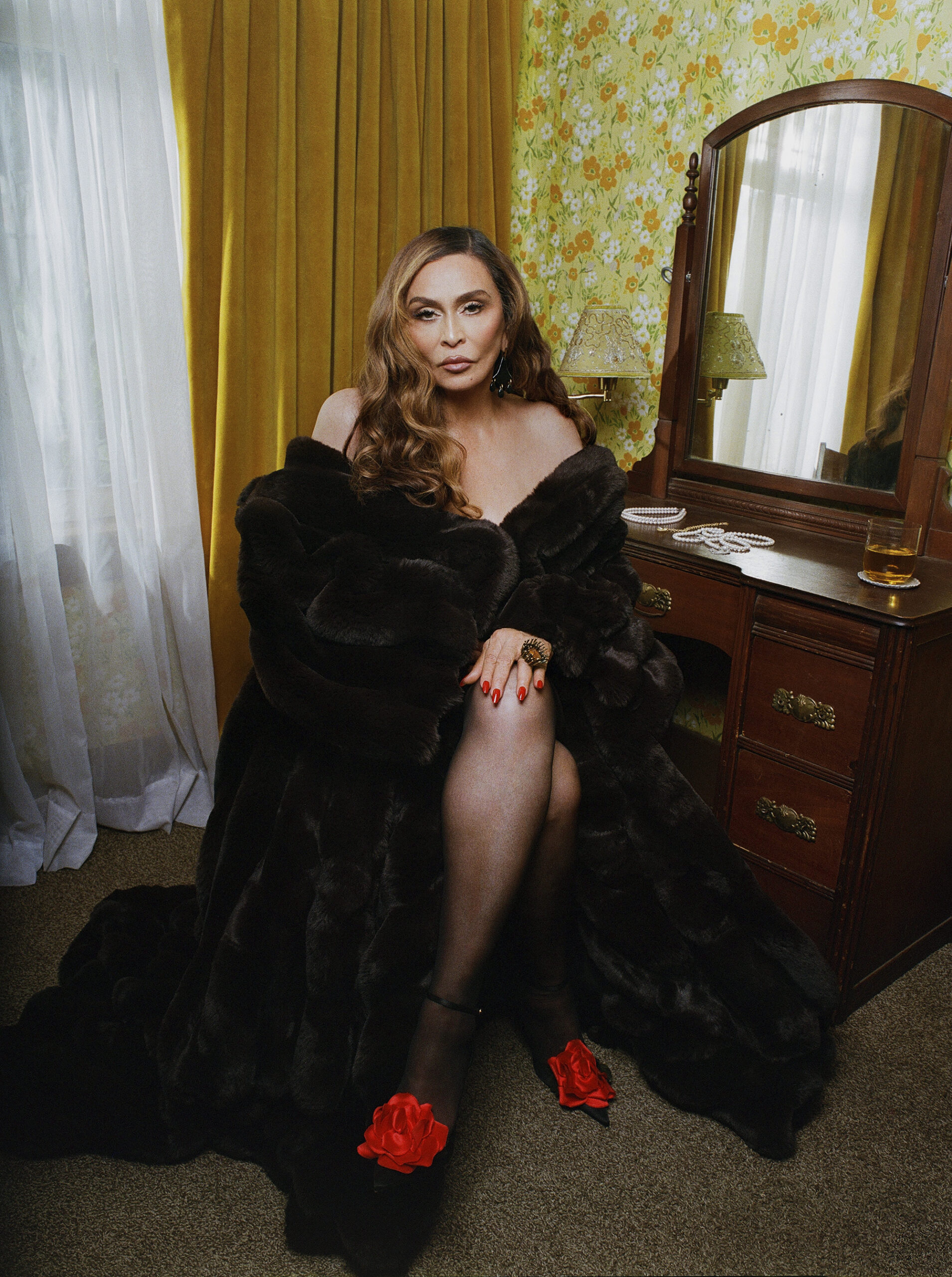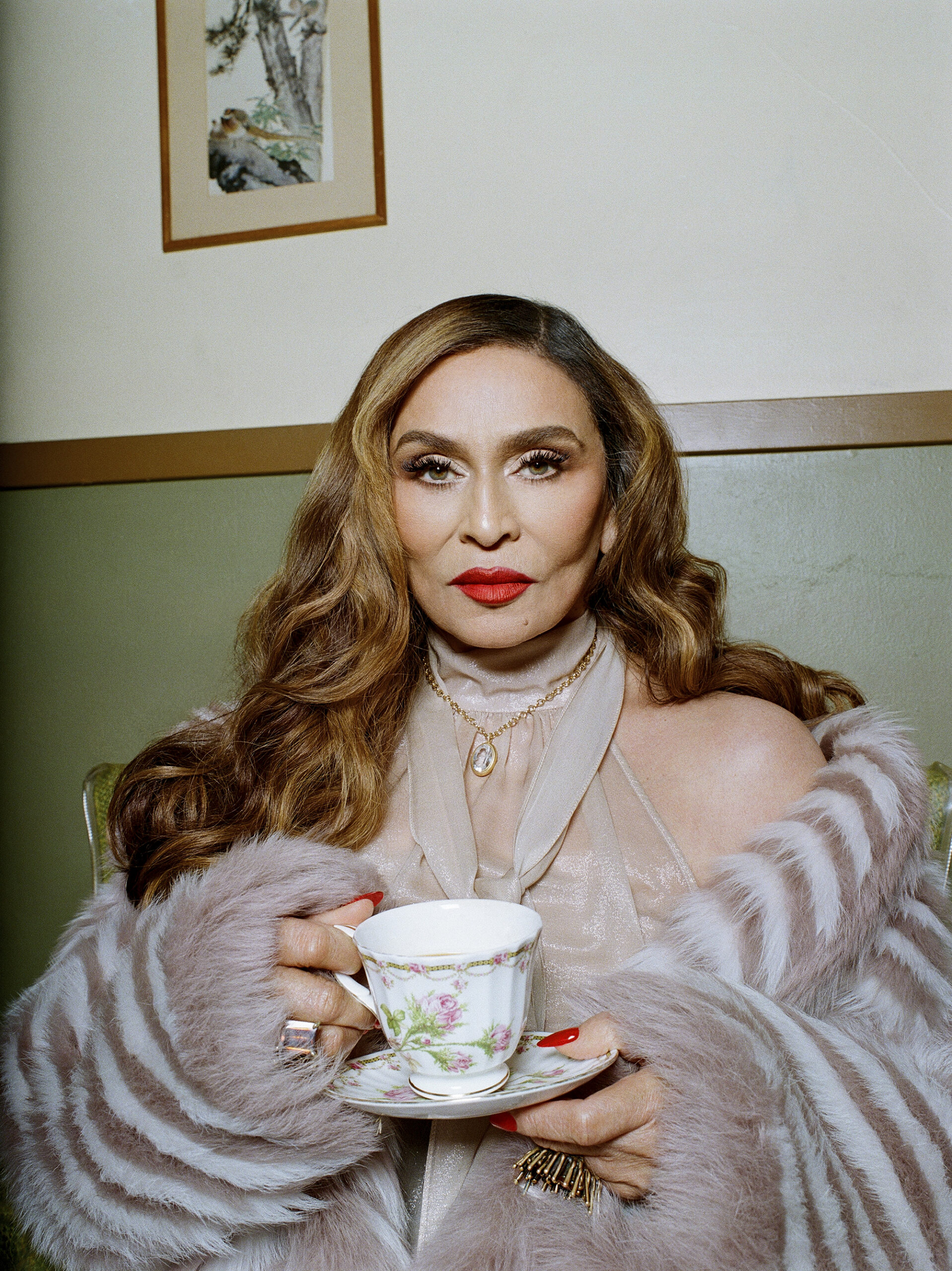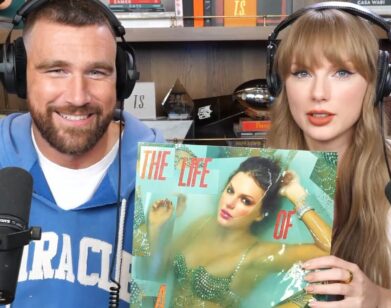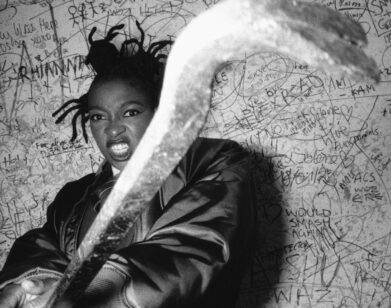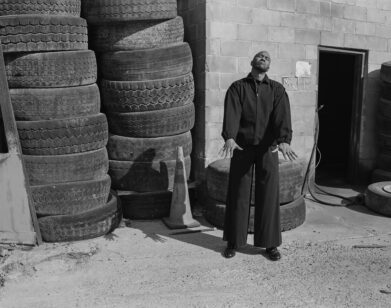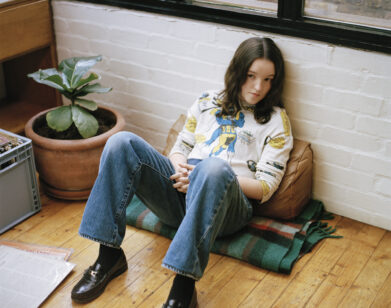MOTHER
Ms Tina Knowles Tells Ellen Pompeo How She Built an Empire of Women
Tina Knowles is a mom to many, but it took a lifetime to put herself first. In a memoir out this April, the entrepreneur recalls her triumphs and traumas, from an impoverished childhood in the segregated South to building a family-run music empire alongside daughters Beyoncé and Solange—and a husband who couldn’t stay faithful. “I got tired of everybody else telling our story and judging us,” the 71-year-old reveals to Ellen Pompeo. “All the misconceptions and all the lies, I just wanted to tell the story myself.”
———
THURSDAY 10 AM MARCH 6, 2025 LA
ELLEN POMPEO: Hi, Ms. Tina!
TINA KNOWLES: How are you doing, Ellen?
POMPEO: I’m so well Ms. Tina. How are you, my love?
KNOWLES: I’m good. I haven’t seen you in so long. I saw Debbie the other night at the Gold Party; she adores you.
POMPEO: I was there too but I couldn’t stay late because I had to get up super early the next day.
KNOWLES: Oh, okay. I stayed until 4:30 a.m. I’m 71 and hanging out until 4:30 so that’s big for me. But it was a good party. [Laughs]
POMPEO: As you should. It was a celebratory event.
KNOWLES: It was. Listen, thank you for taking the time to do this. I know how busy you are.
POMPEO: Well, I appreciate you thinking of me. I was so honored and I enjoyed the book so much. It’s a real page-turner. First, I want to say thank you for writing it—because it’s not only your personal history, but it’s a history lesson at a time when we need to be reminded of American history, and this story is so colorful and rich.
KNOWLES: Oh, thank you. That’s a great compliment.
POMPEO: Did you always know you wanted to write a book? When did this idea come to you?
KNOWLES: People had approached me about it before and I said no, because to write a book is really baring your soul, and I was so protective of my family. They’re so private that I was like, “I’ll be writing a book and I’ll be trying to censor it myself.”
POMPEO: Right.
KNOWLES: But I got tired of everybody else telling our story and judging us. All the misconceptions and all the lies, I just wanted to tell the story myself. Turning 70, you get to the point where you really don’t give a shit about being careful. So as long as I felt like I could do it without telling everybody else’s story, I thought it would be a good thing for me—even if I just left it for my kids and my grandkids. It’s like leaving that piece of history for my family.
POMPEO: That’s incredible. What struck me when I was reading this is your memory, particularly of your childhood. Have you kept journals? How did you remember all these experiences that little BadAss Tenie B went through?
KNOWLES: Well, the biggest thing is that I’ve been in therapy for 20 years. Of course, in therapy, one of the things you do is recount your childhood, so I’ve kept journals on that journey. I don’t know if it reinvigorated my memory, but I can remember many of those stories from when I was little, especially with the nuns. Those things are indelibly burned into my brain because it was a really, really hard time in my life. And having six siblings, four of them close in age, they reminded me every day about BadAss Tenie B. Those stories are big in my family. Now, sometimes things that happened two weeks ago are harder for me to remember than the old memories. [Laughs]
POMPEO: Isn’t it interesting? I always feel like I remember pain more than I remember joy.
KNOWLES: Me too. [Laughs]
POMPEO: As women, when we’ve been through a lot of trauma—and I’m not comparing, because I don’t know the pain of racism—but there’s a level of protection that goes into us. With every year that passes and every trauma that happens, we put up these walls.
KNOWLES: Absolutely.
POMPEO: But I think a real lesson that we learn from this book is that underneath that protective shell, there’s still so much joy, so much creativity. You were able to sew and do hair and nurture your daughters and be a businesswoman in spite of the trauma.
KNOWLES: Oh, thank you for noticing that, because it’s very true. I’ve fought all my life not to be bitter, and I didn’t even realize I was doing that. But thank god for my mother, because she had the worst hardships—I get emotional about it because I had no idea what she was going through half the time, but she still went to mass seven days a week. She still was so kind to everyone. She still took care of her kids to her best ability. She was not a protector, and I struggled with that for many, many years, and I’m the biggest protector of my kids as a result of that. But she did the best she could do and she still managed to have joy in her life. Her family was her joy; creating beautiful clothes was her joy. Charity was her joy. Despite all the crap she was going through, she never became that bitter, mean person. So thank god I had her to model that for me.
POMPEO: Absolutely. You have done so many things at different times in your life. We all know mothering in itself is a full-time job, and you have two very creative daughters. Do you deliberately carve out space for yourself and things that you enjoy?
KNOWLES: [Laughs] I wish I carved out the time. I’m doing it better these days, and writing the book was one of those things. Earlier in my life, I was so protective of my kids and so nervous about this industry that I felt like I had to be ready to be there at the drop of a hat and that I had to protect them. So a lot of times when I should have been focusing on myself, I focused on my kids. I made it look so easy, like I didn’t give it a thought. So if I had life to do all over again, there’s not a lot I would change, but I would give to myself a little more in my younger days, because it took me a long time to see that sometimes I was neglecting myself to be there for my family.
POMPEO: So many of us do that, but I think the good news for you is that it really paid off.
KNOWLES: It did. I have a good relationship with my kids and I helped them dodge many bullets. It was important to have somebody there that was fiercely protective, because they started so young. They had record deals at 15. I was terrified of what could happen.
POMPEO: Yes. There’s so many predators out there. We’ve heard the stories and we’ve seen so many young women in the music industry struggle with mental health because they didn’t have that steady rock when those storms hit. So again, when I look at your family, there’s the obvious success that everybody sees, which is the creative careers of both of your daughters. But the true success is how much time you all spend together. You’re there dancing at 3 in the morning at the party.
KNOWLES: That’s right. [Laughs]
POMPEO: You’re all sitting around laughing and having a great time. Your kids still want you around and you’re still that rock and that sense of comfort. That’s the real success in life.
KNOWLES: Well, thank you. I think so.
POMPEO: I definitely agree. But our feet may not. Our feet may be screaming at the end of the night. [Laughs]
KNOWLES: Well, they provide house shoes. So thank god for that.
POMPEO: [Laughs] Okay. So you started off by saying how free we feel later on in life when we’re so tired of being worried about everything. Do you have any anxiety about the book coming out?
KNOWLES: I did at first, and I actually got to do a podcast with Oprah last week, and it got me through it. It’s like having a baby. I feel like I’ve given birth again, I want to protect my stories. I don’t want people to judge me. I don’t want them to draw conclusions. But once I was in that room with Oprah, and there were about 40 or 50 women there, I felt so much better.
POMPEO: Right.
KNOWLES: There are things in the book about my marriage—I stayed for 33 years in a marriage that was half the time amazing, and the other half very heartbreaking. I dealt with infidelity, and I felt like people were going to judge me and say, “Gosh, she’s a doormat. She’s stayed all those years.” That was my biggest fear. Also, some really traumatic things happened to me because of racism, so you never know if people are going to take that and run with it. I don’t want people to make up stories about my kids and my family and change the narrative, but I think I’ve gotten past the worst of my fears.
POMPEO: I’m so happy to hear you say that, because judging is so easy and understanding is harder. People need to judge less and walk a mile.
KNOWLES: That’s right.
POMPEO: Because being a mother is hard; being a wife is hard.
KNOWLES: Absolutely.
POMPEO: You know what’s best for your family and you know what’s best for you, and it’s a huge gift to be able to find inspiration from these stories and the choices you’ve made, good or bad. I think that we could all do with a little less judgment in life. And I’ll say that right before I talk about the racism piece.
KNOWLES: Yes.
POMPEO: It’s a crazy time that we’re living in, and I want to be careful about my words, but I also want to speak my truth. And I also want to say that this book is American history. I’m sorry if people don’t like the truth of what has been done to people, but it has been done.
KNOWLES: That’s right.
POMPEO: You can burn books and say whatever you want; it doesn’t make it true. People have behaved so shamefully. I would encourage everybody to read this book, because if it helps even one person get to a more understanding place and find some empathy—as artists, that’s what we do. You created this world—this book reads like a novel.
KNOWLES: That was the intention.
POMPEO: You see it so vividly, it could be a movie. If you don’t feel anything after you read this book, then you’re stone cold. You’ve got ice water in your veins and there’s no hope for you. You know, Ms. Tina, I tell it like it is.
KNOWLES: You do. I struggle with so many of the stories in the book, especially about my kids, because I’m like, “I don’t want to give anything away,” but the pieces that are in there about them—there’s a reason I’m telling the story and it’s the things I learned from it. I was hoping that people would come through reading the book feeling like they learned something. Not to say I’m any kind of expert, because I was just going with mother’s wit and the things that my mother taught me. But we all have mother’s wit. We all have the ability to figure stuff out and know what’s best for our families, and we just need to challenge ourselves to do that.
POMPEO: I love that. In the book, you talk about how many children you’ve mothered, even Angie [Beyincé] and Kelly [Rowland], children you didn’t give birth to. And I think that’s another brilliant point you made, that we all have matriarchal energy. It’s a gift that we’ve been given from god. I know so many women that never gave birth that are fantastic matriarchs.
KNOWLES: Me too. I see it every day. There were people in my life that didn’t have kids and they had so much love and time and patience to give. Because sometimes, when you’re a mother, it’s a fulltime job and then some. My mentor that I had when I got to be 14, I attribute a lot to her because she showed me a different way, and she was the first person that made me feel like I didn’t have any limitations in my life. She wasn’t my mother. She wasn’t even that much older than me, but she was a matriarch. She was somebody who gave me wisdom and confidence and made me think I was cute for the first time.
POMPEO: Talking about how she made you feel beautiful for the first time, wait till people see the photographs in this book. Obviously you’re extraordinary-looking, but to see the pictures of your mom and your grandma and BadAss Tenie B in her hot shorts—honey.
KNOWLES: [Laughs] Oh, that’s sweet.
POMPEO: Also, I’ve spent time with both of your daughters in their role as mothers, and it really just trickles down. I see you in them and in their kids. They’re both such calm and gentle mothers; you really did an extraordinary job. It’s a pretty sweet thing to be able to see them as mothers first, and then read this book and hear your journey.
KNOWLES: Thank you.
POMPEO: Another thing that I loved about this book is that anyone who’s a fan of Beyoncé knows how much she references Uncle Johnny; we know that he was a huge creative inspiration in her life. But we never hear about Uncle Johnny as a child, and how much of his creativity and love fueled who you are.
KNOWLES: Right. Well, my mom had a saying during our childhoods: “When Johnny farts, you have to be there to catch it.” [Laughs] And I used to get so mad at her, but it was true. I just hung onto Johnny’s every word. He was four years older than me and so creative and so talented and so funny and so free. He knew that he was gay probably from three or four. He was just authentically himself. He dressed different, he wore the biggest Afro ever, the most outrageous clothes. He was very effeminate from early on, and yet he always felt like he belonged anywhere he wanted to be. My brothers and my nephews were all athletes, and they looked up to Johnny. I mean, think about that, back in the 1960s.
POMPEO: In Galveston.
KNOWLES: In this small town in Texas. I didn’t even realize until writing this book just how progressive my family was. The fact that they accepted him and loved him and celebrated him—I’m sure he went through some things, because back then people were really judgmental about someone being gay. But I didn’t ever feel it because he was just so confident. He gave me the courage to be myself and to stand up to people and be free creatively. When I started doing Destiny’s Child, my experience came from me and Johnny’s outfits. He gave me the freedom to be different. I owe a lot of who I am to Johnny.
POMPEO: And the world is a better place with all our colors and all our incarnations. We’re all god’s creatures.
KNOWLES: That’s right.
POMPEO: Well, Ms. Tina, your book is brilliant. The world is a better place because you wrote it. I hope everybody runs out and gets it. And whatever I can do to help support it—I’m always here for you and your family. Always.
KNOWLES: Thank you so much. I really appreciate you. This was wonderful.
POMPEO: I’m sending you so much love and I’m so happy for you.
KNOWLES: Thank you. Alright, well you have a great day.
POMPEO: You too. Take care.
———
Hair: Dhairius Thomas using Cécred at Factory Downtown.
Makeup: Armando Kole.
Set Design: Dylan Lynch at 11th House Agency.
Tailor: Cecilia Aragon.
Photography Assistant: Rudolf Bekker.
Fashion Assistant: Aidan Palermo.
Production: The Morrison Group.
Production Manager: Cecilia Alvarez Blackwell.
Production Assistant: Aaliyah Henderson.
Post-production: picturehouse & thesmalldarkroom.
Location: CinePacks Studios

